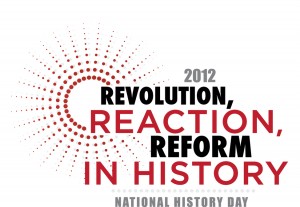National History Day: Is D-Day a Revolution?

National History Day guides students to a close inspection of history. The goal is to make students critical thinkers who can place current events into historical perspective. Students become careful thinkers, better communicators, and develop an awareness of the present. One of the vehicles that helps achieve this is the use of the annual theme. All History Day projects are required to meet the annual theme. In fact, 20% of a student’s evaluation depends on how well the project communicates the theme.
This year, the theme is Revolution, Reaction, Reform in History. This does not necessarily mean that a student in limited to a study of only the American Revolution, the French Revolution, or the Industrial Revolution. Students are welcome to study these topics, and our country would surely benefit from having our students look closely at the events of the American Revolution. Our country also benefits from our young people conducting a close inspection of cultural revolutions, economic revolutions, and international events. Changes in worker safety laws, the changes in government brought about by the New Deal, or the development of an automobile-dependent nation all affect our country’s present, and an inspection of their past can help us plan for the future.
While the theme starts with “revolution,” the reaction and reform portions further serve to guide students. Once the student has selected the revolution, the next task is to find out who was affected by the revolution and how they reacted to it. Analyzing opposing views is very important to having balanced research (another item on the evaluation form.) Looking at reforms that came about because of the revolution helps the student uncover a topic’s historical significance. Memorizing and regurgitating what happened is not the point; finding out what it means is the goal.
The theme poses a challenge to first-year NHD students. Sometimes it can mean excluding a favorite topic. Other times it may mean that they have to trim some of their favorite information from a project. Recently, I had a student contact me for assistance on a project. He wanted to do his exhibit on D-Day and is having a difficult time meeting the theme. The invasion of Normandy was a decisive victory that brought about a major change in the war, but can it be categorized as a revolution? Are there other aspects of the operation that can be looked at as revolutionary? National History Day involves a collection of scholars, history buffs, and supporters to help students think historically. What advice would you give this student? Can the invasion of Normandy be a revolution?
This post by Louisiana History Day Coordinator Nathan Huegen.
- Posted :
- Post Category :
- Tags :
- Follow responses to this entry through the RSS 2.0 feed. You can skip to the end and leave a response. Pinging is currently not allowed.
2 Responses to “National History Day: Is D-Day a Revolution?”
Alex kershaw says:
Yes, the most important for Americans since 1776.
Nathan says:
Alex,
Could this student quote you on your comment?
Thanks,
Nathan Huegen
Louisiana History Day Coordinator



